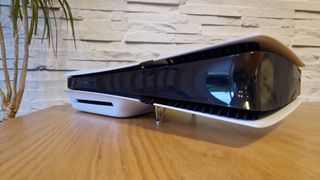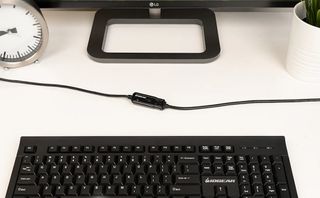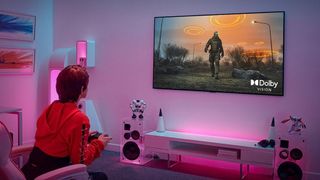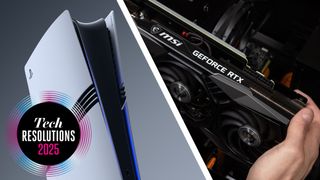I’ve got a plan to go in a different direction when it comes to my living room gaming in 2025 – and you might be in a similar boat to me with your setup.
If so, I reckon my alternative couch gaming scheme might be of interest, and it goes a little something like this…
PS5 Pro stumbling blocks
First off, I’ll outline the vessel I’m currently aboard for my sofa-based gaming (and I’ll drop the sailing analogy while I’m at it). That’d be the good ship PlayStation 4 Pro (that’s the last one, promise) which is used in my living room. And in the study, down the hall, is my gaming PC, which I point out for reasons that’ll soon become clear.
As you no doubt noticed, this year, in November, the PlayStation 5 Pro was released, which led to a considerable amount of mulling about whether to sell off my PS4 Pro and buy Sony’s newest console. It was a tempting prospect initially, but the PS5 Pro’s weighty price tag – and worries around the potency of the graphical upgrade it delivered, as pointed out our PS5 Pro review – made me have a rethink.
It was, after all, a lot of money to spend on a console. Cash that, in the end, I felt could be put to better use in my plan B, which can basically be described as using my gaming PC in the living room. But not moving my gaming PC into that room, of course – that’d never work.
No, my PC will stay exactly where it is – where I need it for actual work in the study – and the plan is to run some long cables from it, through the hallway, to the 55-inch 4K TV in the living room, while upgrading my computer with a very fast new (4K capable) graphics card.

A low-tech solution? Yes, fair point, but I reckon it’s still a good plan, and I’ve got some of the pieces together already. The final piece of the puzzle will be that new desktop GPU, which I’m playing a waiting game for right now. Why? Well, I’ll come back to that.
Cables first, GPU to come as 2025 kicks off
Before coming to the graphics card upgrade, let’s consider those cables. I’ve already bought what I need in this department: first and foremost, that’s a very long (10m) HDMI cable, and two lengthy snaking (12m) USB booster extension cables.
The latter are IOGear USB 2.0 Booster Extension Cables – GUE2118 – with boosters to amplify the signal along the lengthy lead. As for the HDMI cable, I bought a plain low-cost effort, nothing fancy.

If you’re thinking of going this route, you may not need cables quite that long, depending on where your PC is relative to the TV – or you may need longer. Those USB booster extension cords can be daisy-chained, with up to three of them, incidentally, although running leads down the stairs may be impractical or even dangerous.
I want two cables so I can plug in my two PS4 controllers so my wife and me can play couch co-op. Or I can hook up my PC’s mouse and keyboard for single player shooters (or similar) on my 55-inch screen, with the peripherals on a tray over my lap perhaps (not ideal ergonomics, no doubt, so I’ll just have to see how that goes and experiment).
An alternative is that you could use wireless connections rather than the USB booster cables for the controllers or peripherals. It’s true that running three long cables from one room to another is clunky, and that’s the least ideal part of this plan of mine – though it’s something I can live with.

So, wireless controllers (and/or a wireless mouse and keyboard) might be a better path for you. It depends on the distance between the living room and the room where your PC is located, of course, and if the signal strength is okay (and how much interference there might be from other wireless signals in the area). In my case, it’s a fair distance – likely too far – and I’d rather not worry about a flaky connection, or the controllers cutting out, which is definitely not a concern with a direct wired hook-up.
Right, onto the mentioned GPU upgrade. My gaming PC is now showing its age, having an ailing Nvidia RTX 2060 Super inside. When I bought the machine a few years back, that was okay for 1080p gaming, but I was always intending to upgrade eventually. That’s more urgent now, as I subsequently bought a new 1440p (165Hz) monitor.
In short, my graphics card needs an upgrade anyway, so I figured, why not spend that PS5 Pro money on getting a really good GPU that can handle 4K gaming to look truly spectacular on the large 4K TV in my living room.
Then we come to the reason why I want to wait until the New Year before putting this plan into action. Both AMD and Nvidia have new GPUs coming out at the start of 2025 – they’ll (almost certainly) be revealed at CES 2025 imminently, in fact – and those will likely include some good, relatively more affordable, 4K options.

I’m thinking of the Nvidia RTX 5070, or even better, the rumored RTX 5070 Ti, or the AMD RX 8800 XT, or maybe the RTX 5080 even, depending on what happens with these next-gen GPU launches and how pricing shakes out. (Okay, the RTX 5080 is clearly overly optimistic, given that pricing rumors suggest it’ll be seriously expensive – but I can dream, don’t take that from me).
The odds are very much in favor of there being some great new choices for the best mid-to-upper range graphics cards appearing on shelves in January 2025 (or across the first quarter at some point). And it’d be madness not to wait and see the kind of value I’ll get from these GPUs relative to what’s on the market now.
Further price drops may, of course, happen with current-gen GPUs as the next-gen models arrive, so either way, it should be rich pickings for a great value proposition. Fingers firmly crossed, as ever.

The pros and cons of my grand couch gaming plan
For me, the advantages of going this way are that not only do I get a living room setup for an excellent 4K gaming experience on my TV with couch play – that’s going to outgun the PS5 Pro for graphics quality – but I also get the benefit of truly supercharged 1440p frame rates when PC gaming in my study. A double win, essentially.
Furthermore, I can keep my PS4 Pro in the living room (I wouldn’t have got that much for it anyway, looking at current second-hand prices, in my PS5 Pro swap-out upgrade scenario) and still enjoy my PlayStation library (and maybe further games that emerge next year).
On the downside, I’ll miss out on those PS5 exclusives, true. But still, these days, PlayStation ports are coming to the PC with increasing speed and frequency (and they tend to be good versions of said games, too).

My plan won’t be for everyone, I realize that – trailing a trio of cables isn’t exactly an idea solution. It’s rather clumsy and low-tech, as I mentioned, but I think it’s something I can easily live with. I’ll probably only haul the cables out for longer weekend gaming sessions, when we camp out at the TV to plough through a game.
I’m really keen to give this idea a shot and am very hopeful it’ll work out well. I’ve already tested the setup, naturally, with my current RTX 2060 Super GPU, which obviously isn’t up to much for 4K gaming. It did okay with some less taxing games at that resolution, though, and the controllers worked like a dream, as if they’re plugged directly into the PC – which, of course, they are – plus the picture on the 4K TV (an OLED) is perfection.
Some argue you might need a better (fiber optic) HDMI cable, ideally, for fluid 4K gaming in this kind of setup, but I tried a less demanding shooter and found it ran smoothly enough, even on my creaking old graphics card. An upgraded HDMI cable is a potential investment I might look into down the line (the long leads can get pricey). For now, though, I’m happy – well, I will be when I get that new GPU as 2025 kicks off.
There are alternatives, of course, to cables, and not just running the controllers wirelessly as I already mentioned. What might also work in your own scenario is ditching the HDMI lead, too, and opting for a different solution entirely to get a PC in another room onto your living room TV. Namely, streaming using something like the Nvidia Shield TV (with the Sunshine and Moonlight apps, since Team Green killed off GameStream last year). With that scheme of things, and wireless controllers, you wouldn’t have any trailing leads at all.
There are a number of possibilities for powering up a gaming PC to play games on your big-screen TV in the living room while relaxing on your couch. And I believe it’s well worth exploring those options rather than forking out a whole load of cash for a top-of-the-line PlayStation (or Xbox), particularly given how pricey the PS5 Pro turned out to be if you’re in the Sony camp.










 English (US) ·
English (US) ·